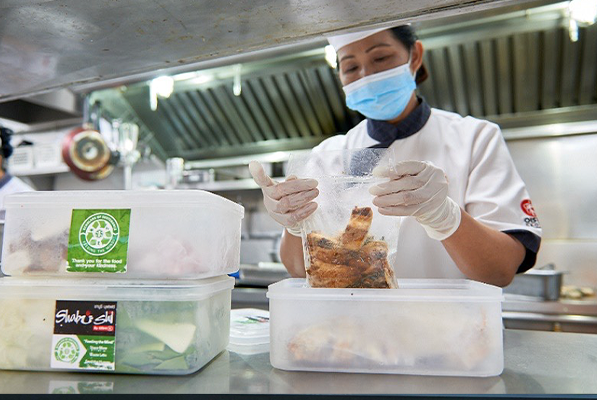ThaiBev collaborates with upstream and downstream partners to create innovative new products and programs to reduce food loss. Among these, the company’s key innovations are:
- Transforming vegetable waste into fertilizer
- Reusing bread crumbs and salmon waste in new food products
- Donating raw material waste to be used as animal feed
- Selling used oil to suppliers to produce biodiesel
Used cooking oil from ThaiBev’s Food Product Group operations in Thailand is eligible to be repurposed into biofuel, so we actively seek out business partners who are willing to purchase our used cooking oil for this purpose.
This results in value generation for both sides while also helping to mitigate climate change. In 2024, the Food Product Group announced a collaboration with BSGF - a joint venture under Bangchak Oil Refinery and Retail Gas Station Group - to drive best practice for managing used cooking oil by collecting the oil and reusing it as a raw material for sustainable aviation fuel (SAF), which can reduce carbon emissions by approximately 80% compared to traditional aviation fuel. Under this initiative, 1,463,460 kilograms of used cooking oil from restaurants were sold to produce biofuel, generating income of around 38.90 million Baht.
In this program, surplus food is donated directly to people living in disadvantaged circumstances. The QSR of Asia, or QSA - ThaiBev’s Food Product Group business unit which oversees the management of the company’s KFC restaurant branches in Thailand - provides surplus food to 8 vocational institutes across Thailand, including the likes of Baan Metta (Nakhon Ratchasima Province), Baan Wangthong (Phitsanulok Province), Baan Maharaj (Pathum Thani Province), and Baan Tabkwang (Saraburi Province) among the arrays of vocational institutes - along with the Scholars of Sustenance (SOS) Foundation. In 2024, KFC restaurants under QSA’s operations donated a total of 5,922 kilograms of high-quality food, which is worth approximately 1.09 million Baht.
ิิิ
ThaiBev’s Food Product Group works with the SOS Foundation to donate food surplus to various vulnerable communities. The foundation works with restaurants to pick up food surplus (either raw or cooked) that is still of high quality and edible. Restaurants are given instructions on how to store the food - including whether containers are necessary, and what food categories are accepted - to ensure the safety of those receiving the food.
In 2024, the project has expanded into 21 restaurants under the Food Product Group in Thailand (14 branches of Shabushi, 5 branches of Oishi Buffet, and 2 branches of Nikuya). A total of 2,268.50 kilograms of food surplus was donated, which is worth approximately 119,349.12 Baht.
In late 2021, The Food group has started its collaboration with FEED Addition, ThaiBev Recycle (TBR), and HAVI to plan together the food loss and waste management project. This project will watch over all of the food loss and waste that the food group has as well as packaging waste and will holistically manage them starting from the production site to the end at the retail level to ensure that food loss and waste will not go to landfill. Moreover, instead of donating all of the food loss and waste, the food group is trying to create income out of its food loss and waste as well. This will be a collaborative work between the Food group and various stakeholders to find potential ways to earn revenues from food loss and waste that are supposed to be thrown away.



